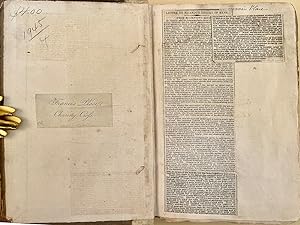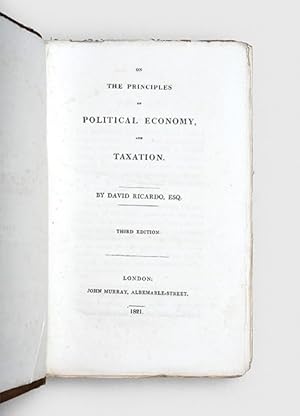principles political economy taxation third de ricardo david (3 résultats)
Filtres de recherche
Type d'article
- Tous les types de produits
- Livres (3)
- Magazines & Périodiques (Aucun autre résultat ne correspond à ces critères)
- Bandes dessinées (Aucun autre résultat ne correspond à ces critères)
- Partitions de musique (Aucun autre résultat ne correspond à ces critères)
- Art, Affiches et Gravures (Aucun autre résultat ne correspond à ces critères)
- Photographies (Aucun autre résultat ne correspond à ces critères)
- Cartes (Aucun autre résultat ne correspond à ces critères)
- Manuscrits & Papiers anciens (Aucun autre résultat ne correspond à ces critères)
Etat En savoir plus
- Neuf (Aucun autre résultat ne correspond à ces critères)
- Comme neuf, Très bon ou Bon (Aucun autre résultat ne correspond à ces critères)
- Assez bon ou satisfaisant (Aucun autre résultat ne correspond à ces critères)
- Moyen ou mauvais (Aucun autre résultat ne correspond à ces critères)
- Conformément à la description (3)
Particularités
- Ed. originale (1)
- Signé (Aucun autre résultat ne correspond à ces critères)
- Jaquette (Aucun autre résultat ne correspond à ces critères)
- Avec images (3)
- Sans impressions à la demande (3)
Langue (1)
Prix
- Tous les prix
- Moins de EUR 20 (Aucun autre résultat ne correspond à ces critères)
- EUR 20 à EUR 45 (Aucun autre résultat ne correspond à ces critères)
- Plus de EUR 45
Livraison gratuite
Pays
Evaluation du vendeur
-
On the principles of political economy and taxation. Third edition. Francis Place's copy with his bookplate and his signature on the front free endpaper. Also various pencil notations probably his. Original boards uncut
Edité par John Murray, London, 1821
Vendeur : Jeremy Norman's historyofscience, Novato, CA, Etats-Unis
EUR 5 774,19
EUR 8,62 expédition vers Etats-UnisQuantité disponible : 1 disponible(s)
Ajouter au panierRicardo, David (1772-1823). On the principles of political economy, and taxation. xii, 538pp. London: John Murray, 1821. 231 x 144 mm. (uncut). Original boards, rebacked, corners worn, light rubbing and staining; preserved in quarter morocco drop-back box. Light toning, edges a bit frayed, but very good. From the library of Francis Place (1771-1854), founder of the modern birth-control movement, with his signature and bookplate on the front endpapers and manuscript notes on the rear flyleaf; a few pencil notes probably his in the margins; 19th-century newspaper clippings on relevant topics tipped to the recto and verso of the front free endpaper. Third edition. David Ricardo is one the most important figures in the development of economic theory. He was one of the founders of the "Classical school" of economics, based on the idea that free markets can regulate themselves. He formalized the principles of the Classical system in his landmark Principles of Political Economy and Taxation (1817), which took the science of "political economy" to an unprecedented level of theoretical sophistication. Ricardo's work dominated economic thought throughout the nineteenth century. This copy of Ricardo's classic work is from the library of his friend Francis Place, author of Illustrations and Proofs of the Principle of Population (1822), a work of great significance in economics, social history and population theory, and the founding document of the modern birth-control movement. "Though many preceded Francis Place in discussing the technique of contraception, he seems to have been the first to venture, at first alone and unaided, upon an organized attempt to educate the masses. Place, holds, therefore, the same position in social education on contraception that Malthus holds in the history of general population theory . . . it was Place who first gave birth control a body of social theory" (Himes, Medical History of Contraception, pp. 212-13; emphasis ours). Place's Illustrations and Proofs was a direct response to Malthus's Essay on the Principle of Population (1798), a copy of which Ricardo had sent him; Place in turn sent the manuscript of his book to Ricardo for comments, and Ricardo replied in a lengthy letter to Place dated 9 September 1821 (Ricardo, Works and Correspondence, vol. 9 [1973], pp. 49-57). .
-
On the Principles of Political Economy and Taxation. Third edition.
Edité par London: John Murray, 1821, 1821
Vendeur : Peter Harrington. ABA/ ILAB., London, Royaume-Uni
EUR 3 796,59
EUR 24,95 expédition depuis Royaume-Uni vers Etats-UnisQuantité disponible : 1 disponible(s)
Ajouter au panierThird edition, first issue, and the last edition with Ricardo's amendments; with excellent provenance, coming from the library of the free-market Nobel Laureate George Stigler, with his bookplate loosely inserted. George Stigler (1911-1991) was, like Ricardo, a lifelong advocate of free market economics, and a leader of the Chicago School. In 1947, he co-founded, with Hayek, the Mont Pelerin Society, the intellectual vanguard of the neoliberal counter-revolution against encroaching government control, later serving as its president from 1976-78. He was awarded the Nobel Prize in Economics in 1982 "for his seminal studies of industrial structures, functioning of markets, and causes and effects of public regulation". George Stigler was gifted a stock of personalized bookplates in his lifetime, but did not use them; they were subsequently loosely inserted into his volumes by his family after his death. Also loosely inserted is a note in Stigler's hand noting he bought the volume in 1978 for 200 dollars. Stigler, as a neoclassical economist, was undeniably moulded by the thought of Ricardo, and his ownership of this volume is particularly compelling. Stigler published a study of the economist, "The Ricardian Theory of Value and Distribution" (Journal of Political Economy, vol. 60, no. 3, 1952), and references Ricardo and his thought many times in his other works. Yet he did criticize the economist, writing in his review of Sraffa's edition of Ricardo's collected works, "I think Ricardo's policy recommendations were profoundly good but his theory was not of the highest quality". Yet Stigler recognizes that Ricardo was a product of his time, an age "when an untutored genius could still remake economic science", and in such an age his thought, even if he did not hold it to be of the highest quality, nonetheless made a tremendous impact on the discipline; "one can indeed debate the desirability of the influence Ricardo exerted on economics, but his vast influence is undeniable" ("Sraffa's Ricardo", in the American Economic Review, vol. 43, no. 4, 1953). Ricardo's Principles was first published in 1817. It is his fundamental contribution to economics, establishing a systematic and scientific approach to the discipline, and setting forth both the labour theory of value and the theory of comparative advantage. His approach and methods influenced all succeeding generations of economists, and provided a foundation of arguments for free trade through to today. This edition contains significant corrections and additions, the most important being a new chapter on machinery which was highly relevant in light of the Industrial Revolution. According to Sraffa, 1,000 copies were printed, the final few with a stop-press change to the last line of text on page 521 altering "it is differently estimated by different persons" (as here) to "it is variously estimated by different persons". Carpenter XXXVII (5); Einaudi 4741; Goldsmiths' 23131; Kress C.769; Sraffa 5c. Octavo. Uncut in original boards, neatly rebacked with facsimile paper label. Extensive early pencilled notes to the front and rear free endpapers of page references, pencilled crosses in margins throughout. Light wear to board edges, some very light foxing, neat repair to short closed tear on terminal leaf; an excellent copy.
-
Om Nationaloeconomiens og Beskatningens Grundsætninger. Oversat efter Originalens tredie Udgave af Sophus Fallesen. (On The Principles of Political Economy and Taxation. Translated from the third edition of the original by Sophus Fallesen). - [THE DISTRIBUTION OF WEALTH - A DEFENCE OF FREE TRADE]
Vendeur : Herman H. J. Lynge & Søn ILAB-ABF, Copenhagen, Danemark
Edition originale
EUR 2 470,17
Gratuit expédition depuis Danemark vers Etats-UnisQuantité disponible : 1 disponible(s)
Ajouter au panierKjøbenhavn, Bianco Luno, 1839. 8vo. Nice comtemporary half calf with gilt lettering and ornamentation to spine. Minor wear to capitals and corners bumped. Light brownspotting to first and last leaves. A very fine and clean copy. (8), 470 pp. Rare first Danish edition of the monumental main work by one of the absolutely most influential classical economists, David Ricardo, the systematizer of economics. The Danish translation is translated from the third edition, which appeared in 1821.David Ricardo (1772-1823) was born in London as the son of a Dutch Jew. Initially Ricardo was primarily interested in science and mathematics, but after having read Adam Smith's "Wealth of Nations" in 1799, he devoted himself entirely to political economy, and in 1817 he could publish his seminal work "The Principles of Political Economy and Taxation" (see PMM 277). Two years later, in 1819, Ricardo was elected to the Parliament, and became the House's acknowledged expert on economic affairs, -also as such he considerably influenced the opinion towards free trade.There are three classical economists, who must be said to have fundamentally changed political economy, and they are Adam Smith, Thomas Robert Malthus, and David Ricardo, -the three main founders of "modern economic analysis". On the basis of "The Wealth of Nations", classical political economy could be founded by Malthus and Ricardo, -in his "Principles". Ricardo was in doubt as to whether he should publish his later so exceedingly famous work, but was persuaded to do so by his friend James Mill, chief Apostle of the Utalitarians, and so he did in 1817, when the work presented the population of Great Britain with some very unexpected conclusions. Enlarging on the Physiocrats, Ricardo places the interest of the landlord and that of the community in the most violent opposition, -he states: "the interest of the landlord is necessarily opposed to the interest of every other class in the community." On the grounds of this theory, he gathered quite a number of opponents, who considered this the embodiment of injustice and strongly opposed of his theories. "Ricardo, in his paradox to arrest attention, outlined the case for class war. It is one of the issues which John Stuart Mill will be forced to confront, and upon which Marx built his theory and makes his observations." (Catlin, A History of the Political Philosophers, Ldn., 1950, p. 374). In opposition to Smith, Ricardo was not interested in the value as the principle for the equal exchange between differentiated individuals, but in it as the means of building up theories of the relation between wages, profits and rents and their distribution to landlords, capitalists and labourers, -thus developing the famous theory of "labour as measure". Against Malthus he opposes the interest of the agriculturalist as against that of the free-trading manufacturer, -one of his distinctive contributions to economics lies in expounding the monopoly theory of rent. "Ricardo was, in a sense, the first "scientific" economist. Lacking Smith's warmth and sympathy for humanity and for the labourer in particular, Ricardo saw the study of economics as a pure science whose abstractions were capable of quasi-mathematical proof. Although his theorems remain hypothetical, his deductive methods have proved a great use in the elementary analysis of economic problems, currency and banking, it has proved a lasting value." (Printing and the Mind of Man 277).The work is groundbreaking in numerous respects, one of them being that Ricardo here also sets out to establish paper-money, -he actualized this as well as the theory that the banks should convert its stock of gold into standardized gold bars, -this is the reason why the very first gold bars, as we know them, were called "Ricardos" the first was issued in 1820.The work has been immensely influential throughout Europe, and has had a strong effect on Danish liberal thought and politics.




![Image du vendeur pour Om Nationaloeconomiens og Beskatningens Grundsætninger. Oversat efter Originalens tredie Udgave af Sophus Fallesen. (On The Principles of Political Economy and Taxation. Translated from the third edition of the original by Sophus Fallesen). - [THE DISTRIBUTION OF WEALTH - A DEFENCE OF FREE TRADE] mis en vente par Herman H. J. Lynge & Søn ILAB-ABF](https://pictures.abebooks.com/inventory/md/md15723875147.jpg)